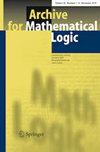Towers, mad families, and unboundedness
IF 0.3
4区 数学
Q1 Arts and Humanities
引用次数: 2
Abstract
We show that Hechler’s forcings for adding a tower and for adding a mad family can be represented as finite support iterations of Mathias forcings with respect to filters and that these filters are \({\mathcal {B}}\)-Canjar for any countably directed unbounded family \({\mathcal {B}}\) of the ground model. In particular, they preserve the unboundedness of any unbounded scale of the ground model. Moreover, we show that \({\mathfrak {b}}=\omega _1\) in every extension by the above forcing notions.
塔楼、疯狂的家庭和无边界。
我们证明了Hechler关于增加塔和增加疯狂族的强迫可以表示为Mathias强迫关于滤波器的有限支持迭代,并且这些滤波器对于地面模型的任何可数有向无界族B都是B-Canjar。特别地,它们保持了地面模型的任何无界尺度的无界性。此外,我们通过上述强迫概念证明了在每个推广中b=ω1。
本文章由计算机程序翻译,如有差异,请以英文原文为准。
求助全文
约1分钟内获得全文
求助全文
来源期刊

Archive for Mathematical Logic
MATHEMATICS-LOGIC
CiteScore
0.80
自引率
0.00%
发文量
45
审稿时长
6-12 weeks
期刊介绍:
The journal publishes research papers and occasionally surveys or expositions on mathematical logic. Contributions are also welcomed from other related areas, such as theoretical computer science or philosophy, as long as the methods of mathematical logic play a significant role. The journal therefore addresses logicians and mathematicians, computer scientists, and philosophers who are interested in the applications of mathematical logic in their own field, as well as its interactions with other areas of research.
 求助内容:
求助内容: 应助结果提醒方式:
应助结果提醒方式:


